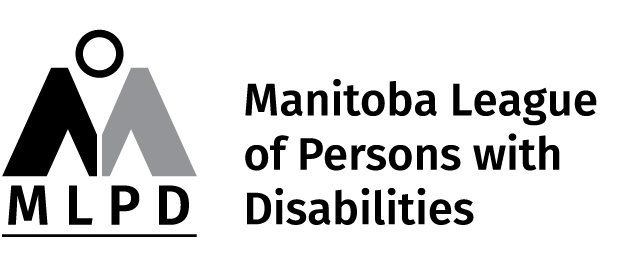In the Community
About MLPD
Together we can create an accessible and inclusive province for all Manitobans.
In the Community
About MLPD
Together we can create an accessible and inclusive province for all Manitobans.
MLPD is dedicated to making a fully accessible province where people with disabilities are provided the same rights and freedoms.
The Manitoba League of Persons with Disabilities (MLPD) was founded in 1974 in the era of the civil rights movement. Originally known as the Manitoba League of the Physically Handicapped (MLPH), MLPD began as a consumer-controlled organization with the goal of influencing the quality of services for people living with disabilities in the province of Manitoba. To learn more about MLPD’s past, in the form of oral history scroll below.
MLPD is dedicated to making a fully accessible province where people with disabilities are provided the same rights and freedoms.
The Manitoba League of Persons with Disabilities (MLPD) was founded in 1974 in the era of the civil rights movement. Originally known as the Manitoba League of the Physically Handicapped (MLPH), MLPD began as a consumer-controlled organization with the goal of influencing the quality of services for people living with disabilities in the province of Manitoba. To learn more about MLPD’s past, in the form of oral history scroll below.
Oral History
Founded in 1974 upon strategies and lessons learned from the civil rights movement, MLPD was originally known as the Manitoba League of the Physically Handicapped (MLPH). MLPD began as a consumer-controlled organization with the goal of influencing the quality of services for people with disabilities in Manitoba.
Advocating for accessible transportation was one of the first major issues the organization tackled in the 1970s, as people with disabilities needed reliable transportation to participate more fully in the community. These efforts paid off, as MLPD was instrumental in creating the Handi-Transit service in Winnipeg.
Members worked hard to ensure that people with disabilities had a voice in the services and supports they need to live in the community. MLPD activists lobbied for an active role in altering the policies of the Society of Manitobans with Disabilities (now known as Manitoba Possible) to include consultation with people with disabilities. MLPD continues to work with provincial and municipal governments to advocate for effective representation of people with disabilities.
The MLPD Oral History Project is a collaboration between the MLPD, The University of Winnipeg Oral History Centre, and The Canadian Centre on Disability Studies (now known as Eviance).
The goal of this project is to highlight the efforts and accomplishments of some of our original members who lobbied for the rights and removal of barriers for people with disabilities in Manitoba. It will also preserve our history in a way that can be shared and studied.
Founded in 1974 upon strategies and lessons learned from the civil rights movement, MLPD was originally known as the Manitoba League of the Physically Handicapped (MLPH). MLPD began as a consumer-controlled organization with the goal of influencing the quality of services for people with disabilities in Manitoba.
Advocating for accessible transportation was one of the first major issues the organization tackled in the 1970s, as people with disabilities needed reliable transportation to participate more fully in the community. These efforts paid off, as MLPD was instrumental in creating the Handi-Transit service in Winnipeg.
Members worked hard to ensure that people with disabilities had a voice in the services and supports they need to live in the community. MLPD activists lobbied for an active role in altering the policies of the Society of Manitobans with Disabilities (now known as Manitoba Possible) to include consultation with people with disabilities. MLPD continues to work with provincial and municipal governments to advocate for effective representation of people with disabilities.
The MLPD Oral History Project is a collaboration between the MLPD, The University of Winnipeg Oral History Centre, and The Canadian Centre on Disability Studies (now known as Eviance).
The goal of this project is to highlight the efforts and accomplishments of some of our original members who lobbied for the rights and removal of barriers for people with disabilities in Manitoba. It will also preserve our history in a way that can be shared and studied.
Interviews
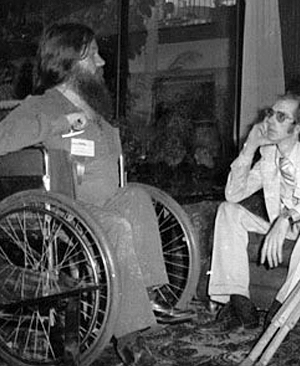
A Call to Action: Jim Derksen
Length: 43 secs
Jim Derksen was the first Executive Director of the Manitoba Disabilities Issues Office. He was also a Provincial Coordinator of the Manitoba League of Persons with Disabilities. Jim Derksen talks about his challenge to the MLPD membership to get out and speak about disability issues.
The Case for an Organization of Persons with Disabilities:
Clare Simpson
Length: 1 minute 44 seconds
Clare Simpson is currently an employee of the Council of Canadians with Disabilities. She has been active in the disability rights community since the mid-seventies and involved with the program “In The Company of Friends” for 18 years.
Clare Simpson talks about the need for people with disabilities in Manitoba to have a voice which lead to the formation of the MLPD.
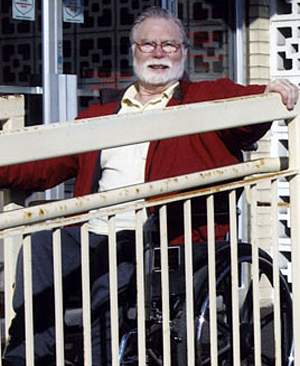
Disability Activism in Rural Manitoba: Derek Legge
Length: 2 minutes 49 seconds
Derek Legge originally became involved with the Manitoba League of Persons with Disabilities in 1975, where he started the first branch of the MLPD in Brandon, MB. After moving back home to Winnipeg in 1977, he began working in the area of employment and disability, eventually becoming an Intake Officer at the Manitoba Human Rights Commission in 1987 until retirement in 2004. He received the CCD Award in 2003 for initiating a number of access-promoting projects over the years.
Derek Legge talks about his reasons for getting involved in starting the first branch of the MLPD in Brandon, MB.
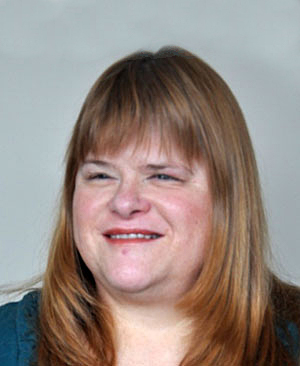
Getting Involved: Paula Keirstead
Length: 44 seconds
Paula Keirstead is an individual and systemic rights advocate primarily in the areas of disability, women’s issues and poverty and has addressed these issues at the local, provincial, national and international levels. Presently she works at Legal Aid Manitoba as a Community Advocate with the Poverty Law Unit.
Paula Keirstead talks about how getting involved in the MLPD made her more comfortable with the fact she had a disability.
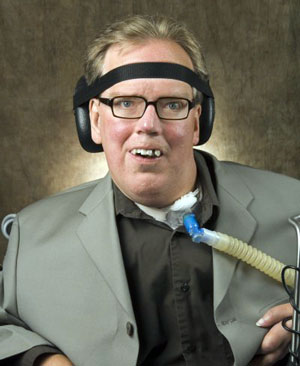
Becoming Provincial Coordinator: Dave Martin
Length: 29 seconds
Dave Martin is the Senior Advisor on Disability Issues with the Province of Manitoba. From 1983 to 2000, he was the Provincial Coordinator of the Manitoba League of Persons with Disabilities.
Dave Martin talks about becoming the provincial coordinator of the MLPD.
Getting Involved: Doreen Demas
Length: 1 minute
Doreen Demas is a member of the Indigenous Persons with Disabilities Global Network and the Indigenous Persons with Disabilities Caucus. Doreen Demas talks about her involvement with the MLPD.
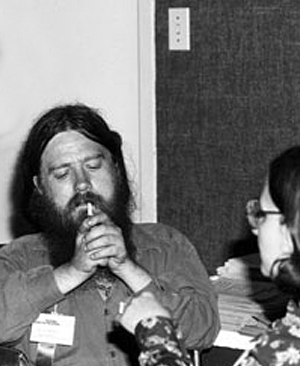
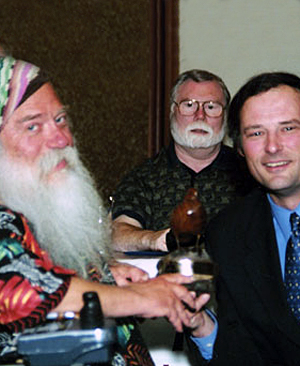
The Struggle for Control: Jim Derksen
Length: 3 minutes 24 seconds
Jim Derksen was the first Executive Director of the Manitoba Disabilities Issues Office. He was also a Provincial Coordinator of the Manitoba League of Persons with Disabilities.
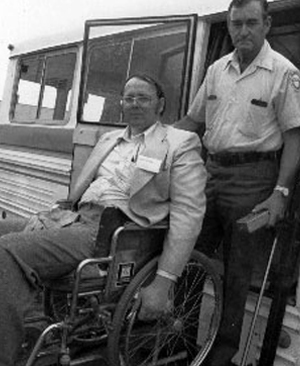
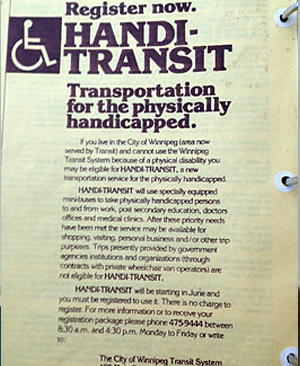
The Quest for Accessible Transportation: Jim Derksen
Length: 2 minutes 28 seconds
Jim Derksen was the first Executive Director of the Manitoba Disabilities Issues Office. He was also a Provincial Coordinator of the Manitoba League of Persons with Disabilities. Jim speaks about the struggle to gain accessible transportation in Manitoba.
Acknowledgements
Steering Committee
- Mary Horodyski, Archival Studies Student at University of Manitoba
- Heather Bidzinski, Head of Collections at Canadian Museum for Human Rights
- Sharon Reilly, Past Oral History Program Coordinator at Canadian Museum for Human Rights. (Retired)
- Nolan Reilly, Co-Director of Oral History Centre, University of Winnipeg
- April D’Aubin, Executive Secretary of Manitoba League of Persons with Disabilities
- Kent Davies, Audio Technician at Oral History Centre, University of Winnipeg
- Kimberly Moore, Program Coordinator at Oral History Centre, University of Winnipeg
- Susan L. Hardie, Executive Director at Canadian Centre on Disability Studies
Interview Transcription Completed By:
- Joana Ambira
- Quinton Sanderson
- Cassie Bodnar
- Evan Wicklund
- Kathy Cote
- Emily Ternette
- Courtney Eagle
- Alexandria Kazmerik
Supervision Provided By:
- Michelle Owen
- Susan L. Hardie
A Very Special Thank You to the Following Contributors:
- Allen Mankewich, Canadian Center on Disability Studies
- Jennifer Sande, Provincial Coordinator, Manitoba League of Persons with Disabilities
Acknowledgement of Funders
- Manitoba Tourism, Culture, Heritage, Sport and Consumer Protection, Heritage Grant Programs
- Allan Simpson Memorial Fund
- University of Winnipeg Oral History Centre
- Canadian Centre on Disability Studies
Interviewees:
- Jim Derksen
- Paula Keirstead
- Doreen Demas
- Derek Legge
- Dave Martin
- Josie Concepcion
- Clare Simpson
- Emilly Ternette
- Brian Stewart
Provincial Council
MLPD Staff
Melissa Graham
Executive Director
Melissa Graham
Executive Director
Melissa is a lifelong disability justice advocate based out of Winnipeg. She has over a decade of frontline experience, working for the Self-Managed Attendant Services Program in Ontario and other organizations in the disability sector. Melissa also holds her Masters in Social Work from the University of Toronto, and was working towards her PhD before accepting her position with MLPD. She has a long history in disability policy and research focused on intersectionality, decolonization, social justice and accessibility.
Melissa is well-known for her activist background, particularly as the founder and lead organizer for the Toronto Disability Pride March. She organized this annual event for 11 years while building relationships with other disability grassroots organizations nationally and internationally, and contributing to research on disability movement organizing. She has successfully passed the torch to other organizers to continue the march. She carries what she has learned from this work into the collaborative, social justice work of MLPD.
Debby McLeod
Accessibility Coordinator
Debby McLeod
Accessibility Coordinator
I just want to say how happy I am working with MLPD. I have worked for all of my adult life in the Health Care Industry. The last 20 years before retirement I worked as the Critical Equipment Specialist in the Adult Emergency Dept. at HSC, and in the Surgical Intensive Care Unit.
I am recently new to the Disabled community. In November of 2020, I lost my left leg from below the knee due to a serious bone infection. I am finding new challenges and adventures every day with MLPD. I am constantly learning about the world of non-profit and funding. It takes me back to all the days of fundraising for my children for various sporting activities.
I look forward to continuing to learn with my new adventures in my new world and community. Thank -you for this opportunity.
Sheryl Peters
Projects Manager
Sheryl Peters
Projects Manager
Sheryl is a Winnipeg-based social researcher, non-profit programs coordinator, and artist. She has experienced life-long invisible disabilities. Her previous work focused on social equity, a social justice approach to autism and disability, health and well-being of women and older adults, person-centred health care, and decolonizing/community-based approaches to research and community work. Sheryl’s creative projects include digital video and community arts – most notably digital storytelling projects with Autistic people, their families and educators, and Indigenous women and girls.
Annual Reports
Founded in 1974 upon strategies and lessons learned from the civil rights movement, MLPD was originally known as the Manitoba League of the Physically Handicapped (MLPH). MLPD began as a consumer-controlled organization with the goal of influencing the quality of services for people with disabilities in Manitoba.
Advocating for accessible transportation was one of the first major issues the organization tackled in the 1970s, as people with disabilities needed reliable transportation to participate more fully in the community. These efforts paid off, as MLPD was instrumental in creating the Handi-Transit service in Winnipeg.
Members worked hard to ensure that people with disabilities had a voice in the services and supports they need to live in the community. MLPD activists lobbied for an active role in altering the policies of the Society of Manitobans with Disabilities (now known as Manitoba Possible) to include consultation with people with disabilities. MLPD continues to work with provincial and municipal governments to advocate for effective representation of people with disabilities.
The MLPD Oral History Project is a collaboration between the MLPD, The University of Winnipeg Oral History Centre, and The Canadian Centre on Disability Studies (now known as Eviance).
The goal of this project is to highlight the efforts and accomplishments of some of our original members who lobbied for the rights and removal of barriers for people with disabilities in Manitoba. It will also preserve our history in a way that can be shared and studied.
